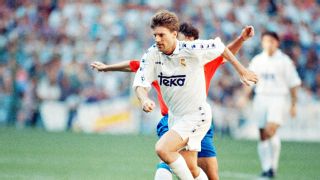|
The world may have been captivated by two of Barcelona's finest attackers during the summer of 1994, but Spain's attention was still somewhat diverted by the movements of the third of the Camp Nou's stars. Because while Hristo Stoichkov and Romario lit up that year's World Cup, Michael Laudrup was preparing for a controversial transfer to Clasico rivals Real Madrid. The speculation was that he had fallen out with Barca manager Johan Cruyff. Years later, however, Laudrup offered another explanation to BBC Sport. "I heard stories I'd fallen out with Cruyff, that other things happened, but none of it was true, none of it was my reason for leaving. "There was another issue -- the 1994 World Cup. Barca had nine players in the Spanish squad plus Ronald Koeman, Hristo Stoichkov and Romario, all going to the U.S. "I knew from experience that the season after can be difficult if you have a lot of players who have been to the World Cup, with injuries and so on. So I thought, this is the moment to leave." The question is whether Laudrup is actually right. Does the World Cup have that much of an effect on the club season? If so, what is the extent of it and where? While the manner in which the tournament distorts the transfer market has been widely discussed, does it also influence the domestic leagues? For his part, Laudrup was immediately vindicated by a 1994-95 Spanish league victory with Real Madrid, ending Barcelona's run of four successive titles. It is also part of a wider trend. Laudrup seems right. Looking at the four major European leagues -- England, Spain, Germany, Italy -- in the time since the World Cup expanded to 24 teams in 1982, only seven of 32 teams have retained the title in the year after the international tournament. That's an average of just over one in every four, when the usual number for a team retaining a major league is just over one every three, but it would seem to go deeper than numbers. Laudrup's old 1990-94 Barcelona, known as the "Dream Team," are not the only dominant side to endure a buckle and a break in their success after a World Cup. There were also Giovanni Trapattoni's Juventus in 1982-83, Liverpool's 1986 double winners, Real Madrid's 1985-90 "quinta del buitre," Fabio Capello's Milan in 1994-95, Alex Ferguson's first title-winning Manchester United team from 1992 to 1994, Marcello Lippi's Juventus in 1998-99, Frank Rijkaard's 2004-06 Barcelona and Jose Mourinho's first Chelsea team. - Smith: Saints submit to football's hierarchy
- Horncastle: Can Vidic's valour revive Inter?
- Brewin: Man Utd need less talk, more action At the same time, a World Cup has not just proved good for variety. It has also proved good for true diversity. A disproportionate number of unexpected winners, or sides who would be considered genuinely distinctive, have suddenly risen to victory in the year after a World Cup. They include Athletic Bilbao 1982-83, Napoli 1986-87, Sampdoria 1990-91, Kaiserslautern 1990-91, Blackburn Rovers 1994-95, Stuttgart 2006-07 and Borussia Dortmund 2010-11. While there were obviously a number of factors in the success of these teams, the point is they benefitted from the type of World Cup hangover that Laudrup described. This should really be no surprise. The most successful teams -- and particularly those who are especially dominant -- will obviously attract the most attention from their international sides. One of the clearest examples was the Milan team that actually beat Laudrup's Barcelona in the 1994 Champions League final. Seven of the Serie A club's squad were picked for Italy's World Cup squad that summer, which consisted of a gruelling run to the final, and that after four years of relentless success. By the time the new season came around without a good break, most of the players complained of exhaustion. Although Milan again reached a Champions League final -- only to be beaten by Ajax -- they finished a distant fourth in the league. It is a relatively common trend for such sides, even if the nature of the Champions League now makes World Cup fatigue a little more widespread across the super-clubs. You only have to consider Real Madrid and Barcelona. None of this is to say the World Cup will definitely prevent any of last season's major league champions repeating their success, but the trends of the season will be interesting in that regard. Roma, for example, suddenly appear primed as the primary example of that type of Borussia Dortmund surprise. What's more, they are looking to usurp a Juventus team who had ample representation at the World Cup and are already enduring a host of other complications after three years of success. The defending champions are already teetering and it is possible that the effects of Brazil 2014 could push them over. On another level again, there is Bayern Munich's Germany contingent, and the question of whether their victory in South America will in any way condition Pep Guardiola's second season. The World Cup, however, doesn't exactly allow that extra second to draw a breath.
|

